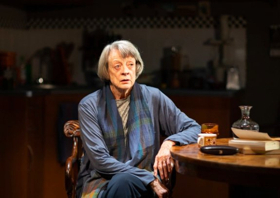Review Roundup: Maggie Smith in A GERMAN LIFE - What Did The Critics Think?

Maggie Smith returns to the stage for the first time in twelve years in A German Life, a new play by Christopher Hampton drawn from the life and testimony of Brunhilde Pomsel (1911-2017). Maggie Smith, alone on stage, plays Brunhilde Pomsel. Directed by Jonathan Kent, A German Life runs for five-weeks until 11 May with all performances at 7.30pm. Design is by Anna Fleischle, lighting by Jon Clark with sound by Paul Groothuis.
Brunhilde Pomsel's life spanned the twentieth century. She struggled to make ends meet as a secretary in Berlin during the 1930s, her many employers including a Jewish insurance broker, the German Broadcasting Corporation and, eventually, Joseph Goebbels.
Let's see what the critics are saying...
Michael Billington, The Guardian: What Smith captures brilliantly is the way, in old age, vagueness of memory co-exists with moments of piercing clarity. Rather than sit in judgement on the character, Smith also presents her from her own point of view. She is unapologetic about her delight in Weimar Berlin or about her initial impression that Goebbels was "damn good looking".
Dominic Cavendish, Telegraph: A compelling history lesson. An acting master-class like no other. Dame Maggie Smith is back on the London stage for the first time in 12 years and - at the age of 84 - commands attention for more than 90 minutes without interruption by virtue of her undiminished expressive powers and the unflagging importance of the tale she has to relay - that of one of Goebbels' secretaries, Brunhilde Pomsel (1911 - 2017), an ordinary woman who got a close-up view of the Nazi operation and yet had a strange and saving myopia when it came to grasping the full monstrosity of the regime.
Sarah Crompton, What's On Stage: It is an astonishing thing to see Maggie Smith hold an audience in the palm of her hand. Alone on stage for an hour and 45 minutes, never leaving her chair, speaking quietly and without any overly dramatic emphasis, she brings a woman and a world to life. You lean forward to hold the nuance and meaning of what she is saying. And what you hear is terrifying.
Aleks Sierz, The Arts Desk: Alone on stage for 100 minutes, Smith mesmerises the audience, not with her familiar waspish putdowns or crazy flightiness, but with something much more insidious and sinister: complete ordinariness. She is compelling because of her calm normality, an old woman having trouble with her memory. Seated for the whole time, her knees pressed tightly together, her gestures are spare but revealing. When she says how much she loved Berlin, her arms make an expansive arc; when she talks about the persecution of the Jews, she bows her head; to help her memory she taps her cranium. When recalling the horrific air raids she briefly touches her stomach. This restraint draws us in.
Andrzej Lukowski, TimeOut: Is it a brilliant performance? It is a totally brilliant performance, just don't expect fireworks. Smith's Pomsel - an altogether less imposing personality than Smith herself - is a woman who seems to constantly be wrestling with something: a struggle to remember? Guilt? Guilt at her lack of guilt? Horror at what previously uninterrogated memories of the Third Reich really signified? Often she stumbles over words or slightly loses her thread: maybe some of this is Smith stalling for time slightly, or perhaps each hesitation or repetition is immaculately scripted. Either way the effect of the same - low key magic, and a remarkable performance.
Tim Bano, The Stage: To begin with she natters away conversationally, reeling us in with a few witticisms (for who can deliver a witticism better than Maggie Smith?). When she forgets something, you feel like gently prompting her. It's as if there's this thin veil, ready to slip at any moment, that marks the difference between Brunhilde and Maggie. The slightly too long pauses as she recollects something: Brunhilde or Maggie? The knowing line: "my memory is not what it was" - Brunhilde or Maggie?
Reader Reviews



